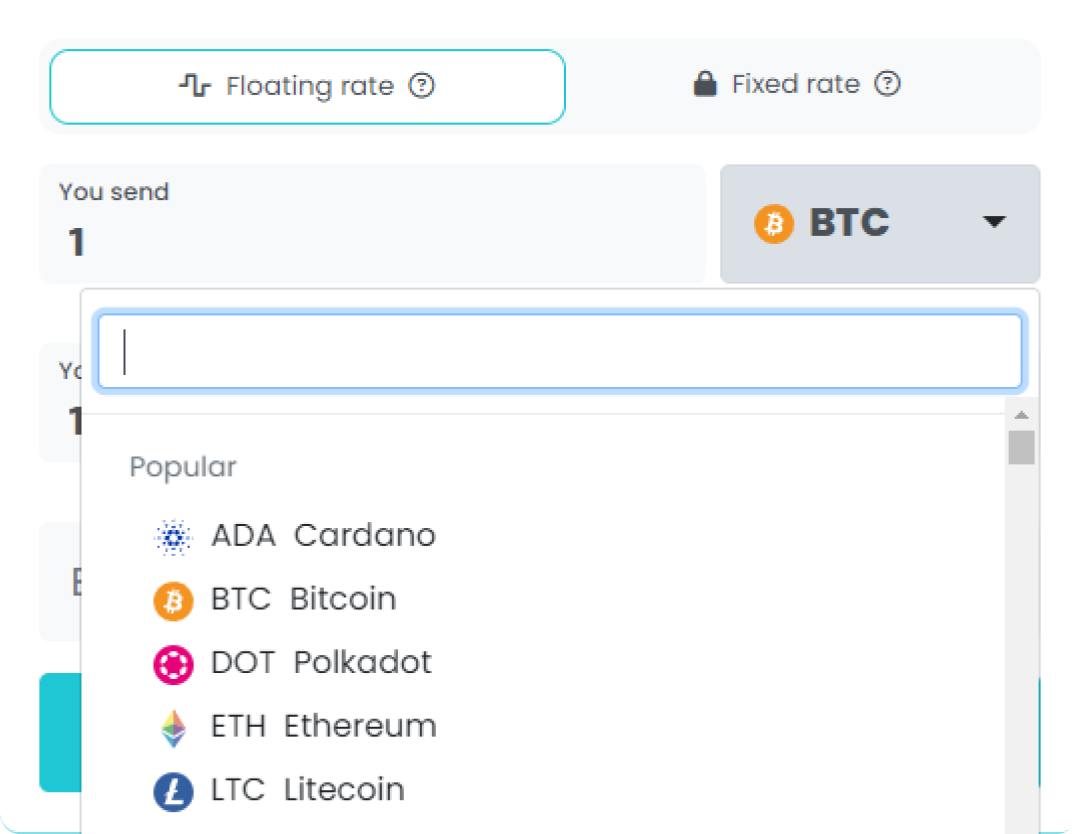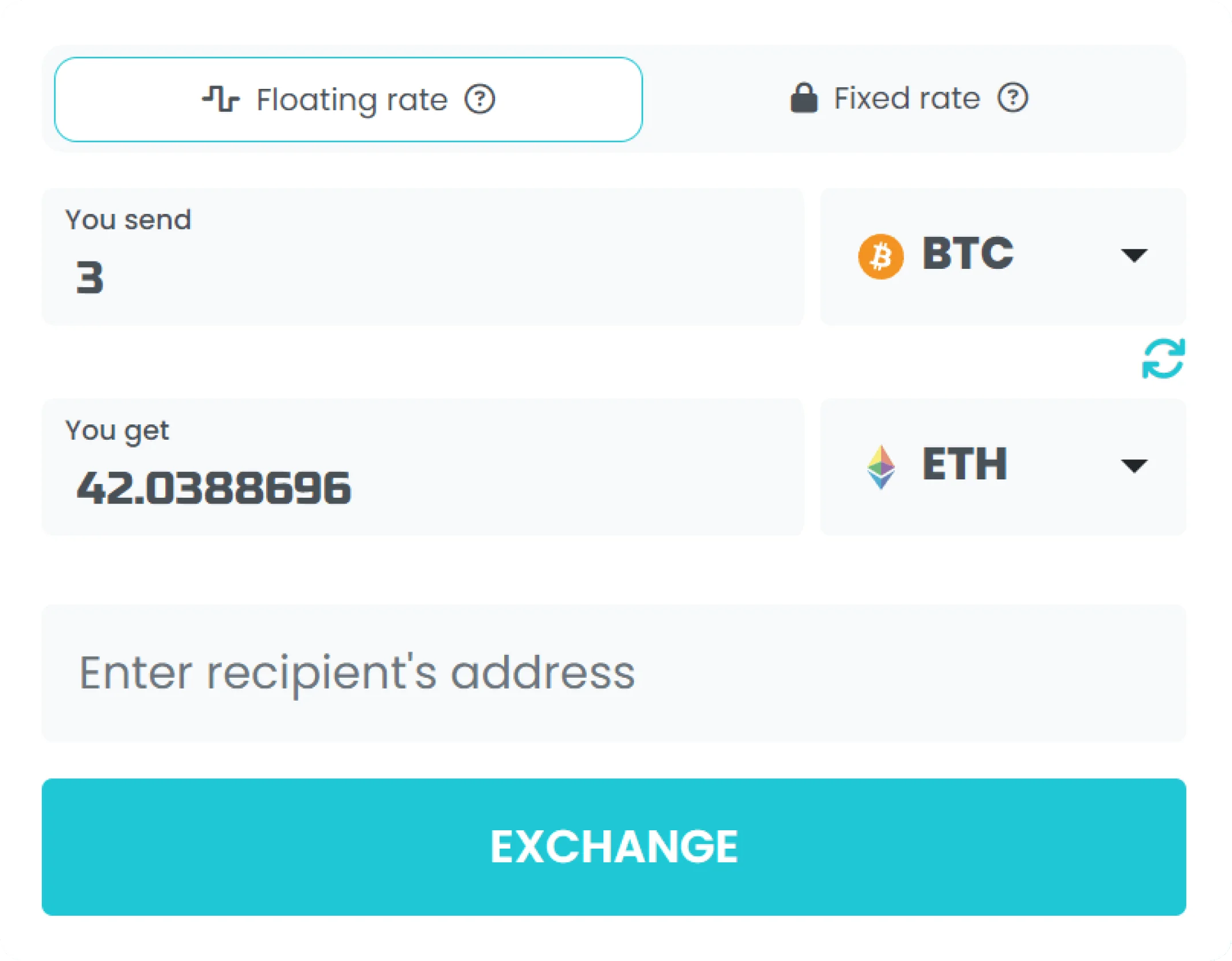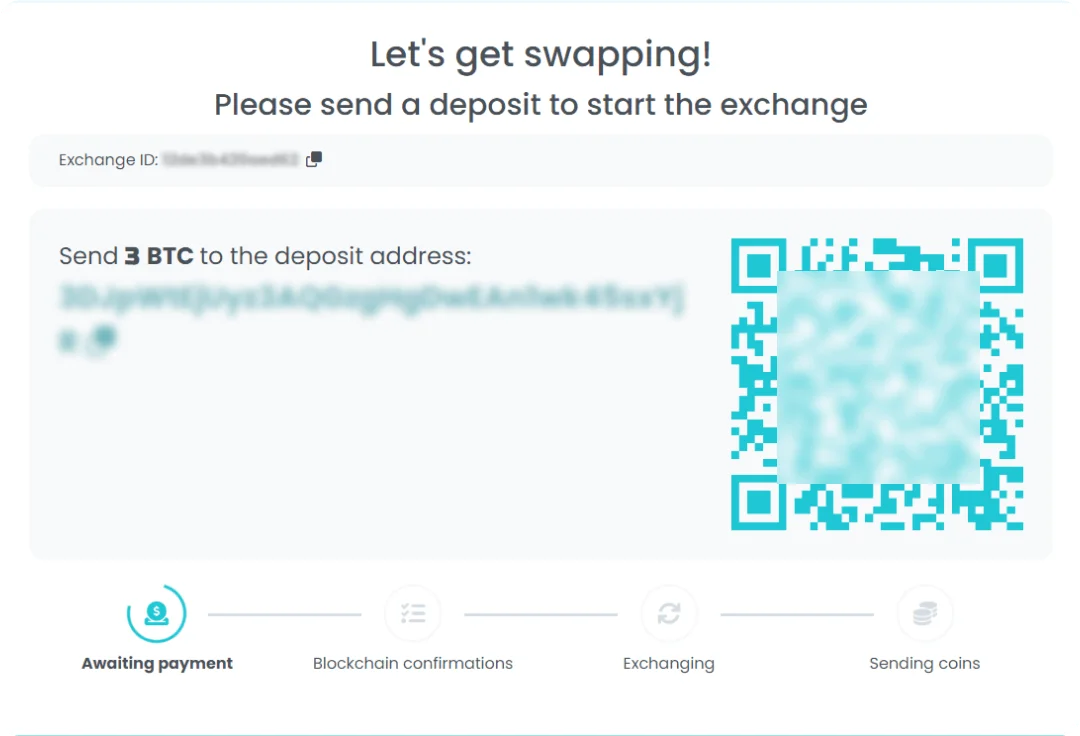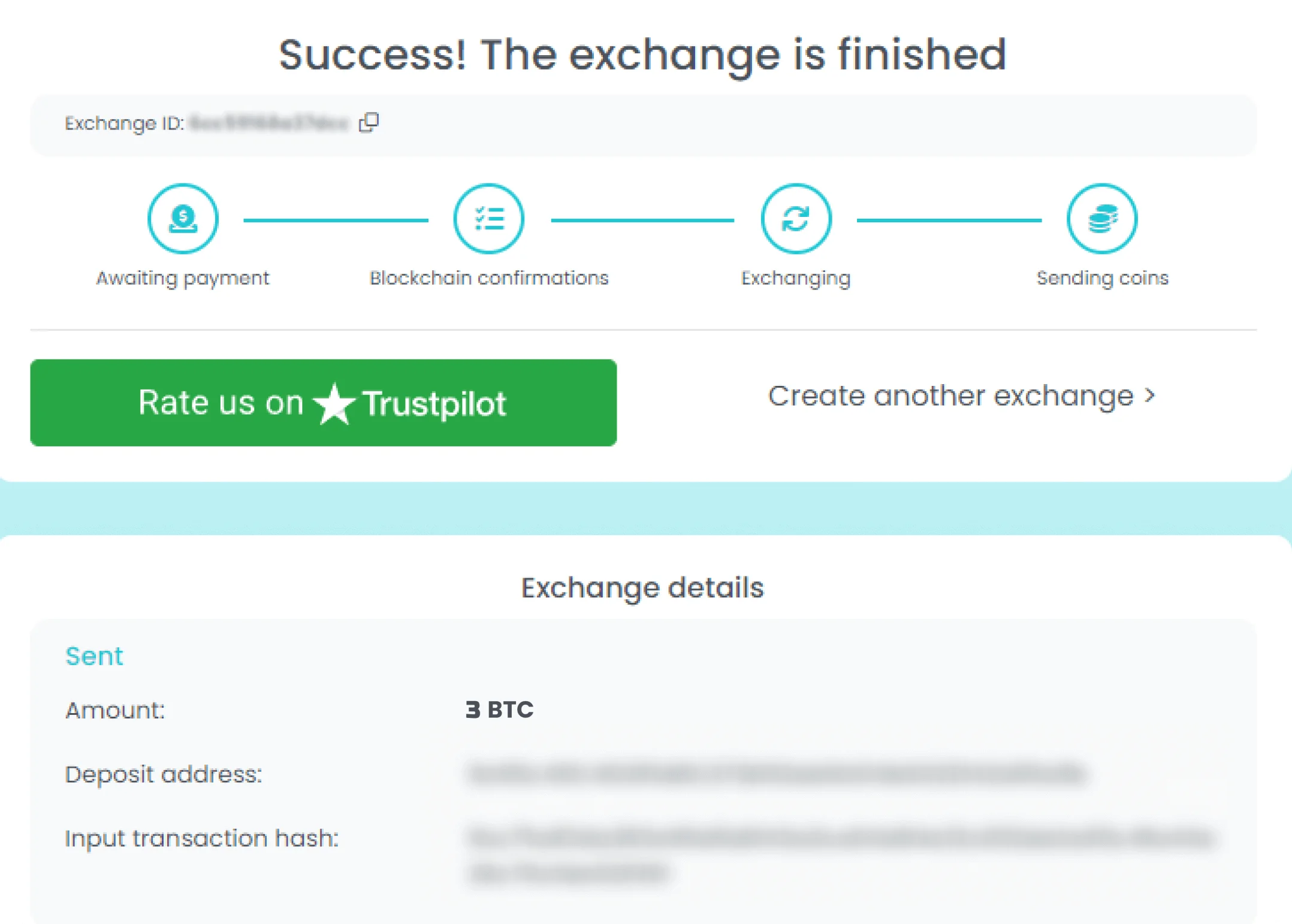How to Exchange Monero (XMR)
Exchange XMR instantly
Swap Monero (XMR) in a few clicks on Exchang.io.
Registration and limits free service.
Historical Price Chart
Monero Current Market Data
| Name | Monero |
|---|---|
| Price | $211.95 |
| Price Change 24h | 0.75% |
| Price Change 7d | 10.37% |
| Price Change 30d | 10.18% |
| Price Change 60d | 30.93% |
| Market Cap | $3,909,737,307.64 |
| Circulating Supply | 18,446,744.07 XMR |
| Volume 24h | $88,090,522.82 |
How to Exchange Monero in Just a Few Straightforward Steps
If you are looking to XMR exchange, you are in the right place. Swap Monero in a matter of minutes using Exchang.io crypto exchange. Just adhere to these 4 simple steps.




Why exchange Monero?
Things you will be able to do with exchanged XMR:
Enjoy Private Transactions
Monero's advanced privacy features ensure that your transactions remain confidential, protecting both the sender's and receiver's identity.
Access a Wide Range of Purchases
Spend your XMR on a variety of goods and services, as many merchants and service providers accept Monero as payment.
Make Anonymous Donations
Support creators or charities with anonymous tips or donations using Monero.
Invest and Trade
Monero's popularity makes it a good nvestment option. Buy, sell, or trade XMR or hold it as a long-term investment.
What is Monero?
Monero (XMR) is a privacy-focused, open-source cryptocurrency that was launched in April 2014, with the primary aim of providing increased anonymity and privacy for its users compared to other cryptocurrencies like Bitcoin. Built upon the CryptoNote protocol, Monero offers several features that set it apart from other digital currencies in terms of privacy and security.
One of the key privacy features of Monero is the use of ring signatures, which obscure the sender's address by combining it with several other addresses, making it difficult to trace the origin of a transaction. Stealth addresses are another feature that Monero employs to enhance privacy. They allow the receiver to use a one-time public address, which ensures that the recipient's actual address remains hidden, preventing any link between transactions.
Monero also incorporates confidential transactions (RingCT) to conceal transaction amounts. This is achieved by using cryptographic techniques that enable the network to verify the validity of transactions without revealing the actual amounts involved. Collectively, these privacy features make Monero transactions untraceable and unlinkable, which has attracted users who value financial privacy and security.
In addition to its privacy features, Monero has implemented a unique mining algorithm called RandomX, which is designed to be resistant to Application-Specific Integrated Circuit (ASIC) mining. ASIC resistance ensures that Monero mining remains decentralized and accessible to individual miners using consumer-grade hardware, such as CPUs and GPUs, rather than being dominated by specialized mining equipment. This approach fosters a more egalitarian distribution of mining rewards and helps maintain the security of the Monero network.
Furthermore, Monero has a dynamic block size and adaptive block reward system, which allows it to adjust more smoothly to changes in transaction volume and mining power. This flexibility helps to maintain the network's stability and performance, even as it grows and evolves over time.
In summary, Monero (XMR) is a privacy-centric cryptocurrency that provides its users with advanced anonymity features, such as ring signatures, stealth addresses, and confidential transactions. Its ASIC-resistant mining algorithm, dynamic block size, and adaptive block reward system also contribute to a more decentralized and secure network.
Brief History of Monero
Monero was created in April 2014 as a fork of the Bytecoin cryptocurrency. The fork was initiated by a Bitcointalk forum user named "thankful_for_today" under the name BitMonero, which is a combination of "Bit" from Bitcoin and "Monero" from the Esperanto word for "coin."
However, the original creator had disagreements with the community regarding development decisions, and the project was quickly taken over by a group of community members.
The new group of developers rebranded the project to Monero and continued its development. Monero's creation is therefore the result of a community-driven effort, rather than the work of a single individual. While several key developers and contributors have played significant roles in Monero's growth, it is maintained by a decentralized and collaborative community that values privacy and fungibility.
Monero’s Key Advantages and Unique Features
- Privacy and Anonymity: Monero is designed to provide private and untraceable transactions for its users. By using advanced cryptographic techniques such as ring signatures, ring confidential transactions (RingCT), and stealth addresses, Monero effectively hides transaction details, including the sender, receiver, and amount, making it difficult to link transactions to individual users. This level of privacy is not typically available in other cryptocurrencies that have transparent transaction histories.
- Fungibility: Due to its strong privacy features, Monero is a truly fungible currency. This means that each Monero coin is indistinguishable from any other and can be exchanged without concern for its transaction history. In contrast, other cryptocurrencies with transparent transaction histories may suffer from a lack of fungibility if certain coins are blacklisted or discriminated against due to their past use in illicit activities.
- ASIC Resistance: Monero's mining algorithm, RandomX, is designed to be resistant to Application-Specific Integrated Circuits (ASICs). This makes mining more accessible to individual users with consumer-grade hardware, promoting decentralization and reducing the risk of centralization of mining power. ASIC resistance contrasts with other cryptocurrencies where ASIC mining dominates, potentially leading to centralization and reduced network security.
- Adaptive Block Size: Monero's blockchain uses an adaptive block size mechanism, which adjusts the block size limit based on transaction demand. This feature enables the Monero network to scale with increased transaction volume, reducing the likelihood of network congestion and high transaction fees. Many other cryptocurrencies have fixed block size limits, which can lead to network congestion and increased transaction fees during periods of high demand.
- Strong Community and Development: Monero boasts an active and dedicated community of developers, researchers, and users who collaborate to improve the project. The open-source nature of Monero allows for continuous development, innovation, and refinement of the cryptocurrency's features. This strong community focus ensures that Monero remains at the forefront of privacy-centric cryptocurrencies and continues to adapt to the evolving needs of its users.
Is Monero Really Untraceable?
Monero is designed to be as untraceable as possible by employing advanced privacy features like stealth addresses, ring signatures, and RingCT (Ring Confidential Transactions). These features work together to hide transaction details, such as the sender, receiver, and the amount transferred, making it extremely difficult to trace transactions back to individual users or wallets.
However, it is important to note that no privacy technology can be considered 100% untraceable. While Monero's privacy features make it significantly more difficult to analyze transactions compared to most other cryptocurrencies, there is always a possibility that new techniques or vulnerabilities could be discovered in the future that might potentially compromise some aspects of privacy.
That said, Monero is widely regarded as one of the most private and anonymous cryptocurrencies available today. Its privacy features have been extensively reviewed by researchers and continue to be improved and updated by the Monero community to maintain and enhance its untraceability.
10 Facts About Monero
- Launched in 2014: Monero was launched in April 2014 as a fork of Bytecoin, another privacy-focused cryptocurrency based on the CryptoNote protocol.
- Privacy-focused: Monero is designed to offer secure, private, and untraceable transactions, making it a popular choice for users who value privacy and anonymity.
- Fungibility: Monero's privacy features make it a fungible cryptocurrency, meaning that every Monero token is interchangeable and indistinguishable from one another, ensuring that no specific token can be blacklisted due to its transaction history.
- Dynamic block size: Monero has a dynamic block size, which adjusts automatically based on the transaction volume. This helps the network maintain efficiency and scalability as demand for Monero grows.
- Proof-of-Work (PoW) consensus algorithm: Monero uses a PoW algorithm called RandomX, which is designed to be ASIC-resistant, making it more accessible for individual miners using consumer-grade hardware like CPUs.
- Stealth addresses: Monero utilizes stealth addresses, which are one-time use addresses generated for each transaction. This helps to protect the privacy of users by making it difficult to link transactions to a specific user or wallet.
- Ring signatures: Monero uses ring signatures to mix a user's transaction with other transactions, making it difficult to determine the true source of the funds. This adds an additional layer of privacy to Monero transactions.
- Ring confidential transactions (RingCT): Introduced in 2017, RingCT is a protocol upgrade that allows the amount of Monero being transferred to be hidden, further enhancing privacy for users.
- Open-source and community-driven: Monero is open-source, which means that anyone can review, contribute to, or modify its code. Its development is largely driven by a dedicated community of developers, researchers, and users who work together to improve and maintain the project.
- Ongoing development and research: Monero's community is continuously working on research and development to improve its privacy features, security, and scalability. The Monero Research Lab, for instance, is a group of academic researchers dedicated to finding and implementing cutting-edge solutions to enhance Monero's functionality.
What is the Best Place to Exchange XMR?
Via Exchang.io service you can effortlessly swap Monero for over 700+ different assets. Begin by selecting XMR and your desired coin, paying attention to the network when making your choice. Next, provide the recipient's wallet address for the coin you're swapping to, and press "Exchange" to continue. Deposit the required amount of XMR to the address displayed on the screen, ensuring you have the necessary amount to finalize the transaction. Once completed, check your wallet to confirm the arrival of your newly acquired coin. Exchang.io makes exchanging Monero simple and convenient, allowing you to enjoy a seamless experience with an extensive selection of coins to choose from.
Benefits of Exchanging XMR on Exchang.io

Simple
We make sure not to overload our website with unnecessary elements. Only the things you need for smooth Monero conversions.Simple and clear.

Secure
Exchang.io is a safest place to exchange XMR. Get XMR anonymously, without KYC and registration.
In touch
Write to us in any unclear situation with XMR swaps. Our support team is happy to help you 24/7.
Fast
We are constantly upgrading our platform to make Monero exchanges really fast. The average speed for the swap is about 5-15 minutes.Popular Monero trading pairs
Here are some popular XMR trading pairs. You can buy XMR with every listed coin on Exchang.io.
How Much Monero Can I Exchange on Exchang.io?
Exchanging Monero on Exchang.io is unlimited. You can start swapping XMR right now starting from the lower limit of ≈ $3.
There are no upper limits for Monero exchanges at Exchang.io. Exchange Monero with other cryptocurrencies from the list of over 700 coins as much as you want to.
Cross-chain exchanges are available; just choose any coin on any network and click the Exchange button, and we'll do the rest for you
Do I need to create an account on Exchang.io to swap Monero?
No. You don’t need to provide any personal information or create an account. Exchang.io is a registration free service and free from any other ID verification requirements. Just follow our simple steps and Buy Monero with your crypto.
How long does it take to exchange Monero on Exchang.io?
The exchange process on Exchang.io is extremely fast, and typically takes only a few minutes to complete. Depending on the network traffic and transaction confirmation times, the actual time may vary slightly.
What is the minimum amount needed to swap BTC to LTC on Exchang.io?
There is a minimum amount required for XMR exchange on the Exchang.io platform. However, please note that this minimum amount may change, hence it's recommended to check the platform for the latest requirements.
Is Exchang.io legit? Why should I trust Exchang.io?
Exchang.io team consists of crypto enthusiasts with more than 7 years of experience in the industry. The main goal of Exchang.io is to make a service for the user. Make it convenient, fast, and as transparent as possible. In order to get better, we always keep a close eye on what the community thinks about us in our social networks. You help us to become even better. Check reviews on Exchang.io.
What are some popular Monero trading pairs?
Popular XMR trading pairs on Exchang.io include XMR/BTC, XMR/ETH, XMR/LTC, and XMR/USDT, among others.
Are cross-chain exchanges available for Monero?
Yes, Exchang.io supports cross-chain exchanges for Monero. Choose any coin on any network, click the "Exchange" button, and Exchang.io will handle the rest.
